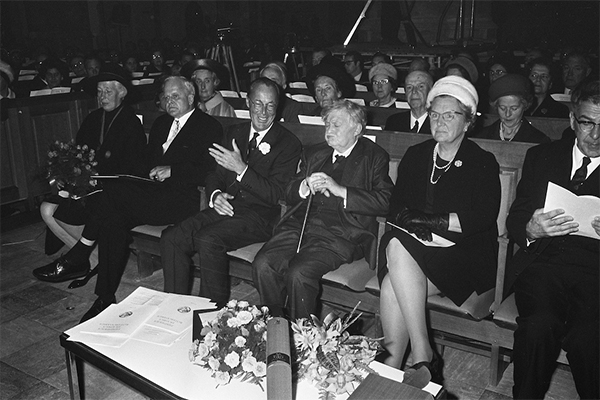
Re-reading Steven Knepper’s essay about existentialist-personalist philosopher Gabriel Marcel in Commonweal (March, 2020), I was reminded that great philosophers frequently transcend the time in which they think and write. Knepper’s essay is entitled “From Problem to Mystery.” Marcel’s insights into the mystery of person were important when he wrote them, some more than a hundred years ago, but they seem to me even more important today. Knepper writes the following:
“Marcel decried the horrific ‘techniques of degradation’ deployed in the concentration camps and the Gulag. He feared that we had more broadly entered an age of ‘problematic’ humanity, where people were treated as ‘cases’ and saw themselves in turn as amalgamations of ‘functions.’ He worried about a tendency throughout late modern culture, from the magazine stand to the doctor’s office to the halls of power, to reduce mysteries to problems; love reduced to a reproductive drive, death reduced to a mere biological endpoint.
Marcel thought people in love or confronted by the death of a loved one may recognize the inadequacy of this, but they may also have lost the language to express mysteries or the wisdom to navigate them.” (p. 20)
I am “technologically illiterate.”
What is obvious to me is that a technological revolution is happening. Some of the advantages that contemporary technology provides are obvious, such as speed in communicating, but what about the disadvantages?
An image I have that suggests some of the problems is a couple dining in a restaurant and each is on a cell phone. An experience I have had often is having a conversation with one or more people that is interrupted regularly by one or two or more of those “involved” in the conversation checking their cell phone. Is the technological revolution aiding or hindering the possibility of deep interpersonal relationships? Surveys suggest that habitual use of cell phones can make it more difficult for persons to relate without a phone as a mediator. Gabriel Marcel, where are you now that we need you?
There is a strong similarity between the philosophy of Marcel and that of personalist Martin Buber, even though Buber creates his philosophy from a Jewish background. Marcel became a Catholic at the age of 40, but his philosophy was already quite developed. Knepper reports that Marcel became a Catholic after the novelist Francois Mauriac wrote him a letter noting Marcel’s proximity to Catholicism and asking him why he did not become a Catholic.
Both Buber and Marcel stress the importance of interpersonal relationships and both insist that there are good ways of relating and ways that are not so good. What Buber calls an I-it relationship Marcel refers to as a relationship of having. What the two thinkers mean by such a relationship is using the other person.
Why would we slip into such a relationship? Perhaps the pace at which we live makes slipping into such a relationship easy. Perhaps a culture of consumerism encourages such relationships.
Both Buber and Marcel claimed that you could not forcefully create an I-Thou relationship. Such a relationship requires the freedom of two. God is always seeking an I-Thou with us but perhaps we do not welcome the divine invitation. Buber claimed that God was so much Thou that an I-it relationship with God is impossible. For Buber God was the Thou who could never become an It. I believe that Marcel would agree.
If an I-Thou cannot be forced, would Marcel claim that we can live in such a way that I-Thou relationships might happen? I think so and I believe it involves one of the most attractive concepts in Marcel’s philosophy’. Knepper writes the following:
“Marcel argued that we should cultivate radical openness to others — what he called disponibilité (roughly ‘availability’ in English). He claimed that healthy relationships with family members, spouses, friends, and neighbors involve a ‘creative fidelity’ based on such openness. This fidelity involves continual attunement and responsiveness. Marcel distinguished it from mere constancy, which can be grudging perseverance in a static, stale relationship.” (p. 21)
There may be no word that perfectly translates what Marcel means by disponibilité. I am wondering if what he means by that word could be what I mean by “holiness.” Could the holy person be described as the person who is available for I-Thou relationships? I think that is a good description of a holy person, one who is ready for an I-Thou relationship with God and with others.
Father Lauder is a philosophy professor at St. John’s University, Jamaica. He presents two 15-minute talks from his lecture series on the Catholic Novel, every Tuesday at 9 p.m. on NET-TV.
